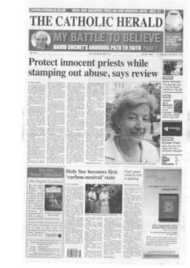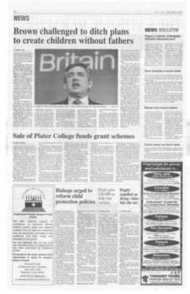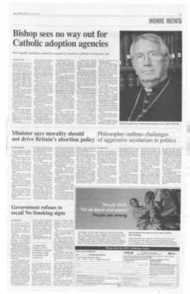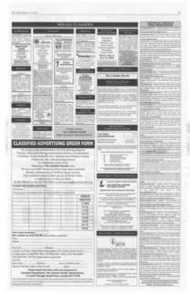Page 9, 20th July 2007
Page 9
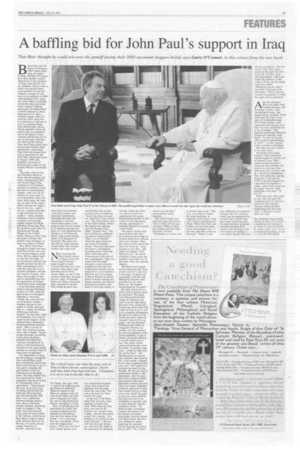
Report an error
Noticed an error on this page?If you've noticed an error in this article please click here to report it.
Tags
Share
Related articles
Tony Blair: No Longer Two Different People?
Blair Extends Formal Invitation To Pope To Visit Britain
Cherie Blair Denies Persuading Tony To Convert To Faith
Blair’s Son Greets Pope At Audience
Cherie's Surprise Audience With Pope
A baffling bid for John Paul's support in Iraq
That Blair thought he could win over the pontiff during their 2003 encounter beggars belief says Garry O'Connor, in this extract from his new book Before they left for Rome in February 2003 Cherie Blair rang and asked Cormac Murphy-O'Connor how they should conduct themselves in the presence of Pope John Paul H. For the audience Cherie wore a black suit and the black lace mantilla of a devout Catholic woman (in contrast to an audience in 2006 with Benedict XVI, when she wore white). It delighted her that they had come with a largely Catholic entourage, including three Catholic detectives, from their pool of 15, and a Catholic nanny, who carried Leo. Now aged two, Leo had drawn a picture to give as a present along with official gifts, but as Cherie kneeled to kiss the pope's ring, he squirmed out of the nanny's arms. Vatican staff let him sit on one of the pope's thrones. Yet there in the Vatican Tony and Cherie must have known and wilfully disregarded how tenaciously John Paul had ranged himself in opposition to the Gulf War, which had begun in August 1990 with Saddam's invasion of Kuwait and in spite of the United Nations' favourable vote.
The pope wrote to the first President Bush to stress the devastating and tragic consequences that war would bring if the coalition of 39 countries resorted to military action. He went to extraordinary lengths, with over 50 initiatives of every kind, to avoid hostilities, then end them, then repair the damage. In spite of the pope's public and private opposition to the war and to war as a general principle in the resolution of any conflict many eminent Catholics were to express complete and strongly argued support for Bush and Blair in the Iraq War, for instance Lord Alton in England and George Weigel in the United States. But as to why Tony had gone to Rome, the pundits were mistaken, at least according to Cherie.
How Blair could have thought he might convince John Paul of his own case for war just beggars credibility. But he argued hard to convince the pope. In the 20-minute audience the pontiff pointed out the terrible consequences if he took that step, the cost in civilian casualties, and the old warrior of peace, who knew the ravages of war and its aftermath from bitter experience in Poland, would have been forthright as he had been when he tried to stop the Falklands conflict in 1982, when he denounced it to Margaret Thatcher's very face. "Today, the scale and horror of modem warfare whether nuclear or not makes it totally unacceptable as a means of settling differences between nations," he had said; while at Hiroshima, on a visit to Japan in the shadow of the skeletal Peace Memorial, he had declaimed passionately: "War is an act of man. War destroys human lives. War is death." In particular the pope, according to his press secretary, pleaded with Blair that "special consideration be given to the humanitarian situation of the Iraqi people already so severely tried by long years of embargo".
It is impossible to imagine the religious standpoint from which Blair could have formed the notion that God could tell him to go to war, and it stretches his and Cherie's belief in Catholicism to breaking point. The Holy Father was not convinced by Tony's arguments and never would be. Presumably, this is speculation Tony played the card, as he was to go on doing, that he had not taken his final decision, and still had doubts. But there was a difference between feeling reservations about a decision already reached, and being ready to change it. The pope, who had received every kind of world leader at the Vatican, would never deny Blair's right to determine what he chose to do. He was, of course, always saying "man has to choose", and had in his time held conversations with many tyrants and notorious malefactors, including the man who attempted to kill him. Cherie then spoke to the pope on her own for another 10 minutes, giving him gifts of a vase depicting the entrance to 10 Downing Street, and a small bronze statue of St Margaret of Scotland. The pope rose and left his study and presented them with rosaries, medals and a fine icon.
Next morning the Blair family attended Mass in the new brown marble floored papal chapel at eight o'clock (the time, as a concession to the pope's age, had been moved from seven). Here, as one of the acolytes observed, the pope sat on a chair 10 minutes before the Mass, facing the altar, absorbed in prayer. This image he gave was, for Cherie, she says, both "a symbol of suffering and the defeat of suffering". When he began to say Mass he sprang to life: he said all the Mass, the first part in English, but when he came to the Eucharistic Prayer, switching to Latin.
Tony, in off-the-peg suit and muted tie (taller and younger looking than he appeared in his photos) read the first lesson from Isaiah, "1 it is who must blot out everything." Euan read the responsorial prayer, "Heal my soul for I have sinned against you", and Kathryn the second reading, from Corinthians, "Jesus was never yes and no: with him it was always yes." The Irish bishop, host at the Irish College, where the family was staying, read the Gospel from Mark, Chapter Two: "The Son of Man has authority on earth to forgive sins." There was no homily, while the pope stood for the whole Eucharistic Prayer. The pope then gave the family Communion, including Tony, while the other celebrants gave Communion to the rest of the congregation. Only two weeks later the pope through a curial directive . emphasised the rule that Communion should not be dispensed to non-Catholics. But here was an example of Karol Wojtyla as parish priest of Rome making the human gesture, and demonstrating that priests were there to serve the family. It was ungracious of papal critics who pointed out gleefully that the pope broke his own rules. This was a decision for Tony, not for the pope.
At the end of the Mass John Paul sat in his chair looking at Cherie and Tony. With those big blue eyes, says one of the acolytes, he "doesn't miss a thing... He has that much power. He's saying: 'I'm looking at all of you [le the whole person]. ". He saw well into the ugly future, too, and from the depth of his experience he probably had the vision that Tony was about to miss the opportunity for a great humanitarian gesture in the cause of truth and peace, and the opportunity to establish himself as a great world leader.
The pope's diction had been distinct and clear he'd been on new drugs to combat Parkinson's disease since last summer. After the silence at the end of the Mass he stood up head leaning to one side and spoke in English. "God bless you all." He shook everyone's hand, gave out rosaries, held little Leo by the hand while the cameras flashed.
The Blairs had considered it important that Tony put his case for a just war to the pope, to square his conscience with the man Mikhail Gorbachev had described to his wife, Raisa, as "the highest moral authority on earth".
But why should he try, when he had already made his decision? The papal visit fitted perfectly this image of wanting to be seen to do the right thing. But how Tony could have formed the notion that God could tell him to go to war is of a singular strangeness. He did so in effect on the Parkinson show, when he claimed "God will be my judge." He told Michael Parkinson that while he struggled with his conscience over the decision, he received guidance from divine authority: to put it bluntly, God had told him it was all right to go to war. The actual words, expressed hesitantly, were that there "is another judgment... made by other people and by God" the meaning plain to anyone who watched, that what he did, in his words, "depended on other judgments than your own". He might have included the pope in that thought. We are now led to understand, thanks to that appearance, that the question of his religious belief was crucial to the most important political decision Tony ever made. Catholics would be surprised if John Paul would ever go or had ever in his whole life gone so far as to voice publicly that God told him to do something so specific, and in such categoric and presumptuous terms let alone invade a sovereign country and expose it to the horrors of modern destruction. Had he prayed with Bush before the invasion, Parkinson asked, repeating the question Jeremy Paxman had put to him in 2003. "No, I don't want to go into that," answered the prime minister.
The critical issue was what the pope had said to Tony in their private conversation. When I asked her, Cherie said that John Paul had told him: "Ultimately, it is up to you to decide what to do." This was, according to Cherie, the exact response. In England on his return, Tony told a friend something different. What John Paul said to him, not once but three times, he revealed, was, "I am very glad this is not my decision." There is a dis tinct difference in emphasis between the two versions, which can be interpreted in several ways. Cherie may have been conveying that the pope had less sympathy towards him than Tony seems to be showing in his own words (or perhaps it was Cherie herself who had the less sympathy). But the words Tony relay carry a sense of the pique he must have felt. In either case and importantly the pope made the Church's stand clear to Tony; and he might well have added: "Whatever you do, don't use God to back up your decisions.Which version exactly corresponds to what the pope said isa mystery.
After the audience Blair held talks with Cardinal Soriano, the Secretary of State, and Archbishop Taman, the papal foreign minister. Both reiterated the pope's message of working through the United Nations , and expressed the Vatican view that war was "stll believed to be avoidable" The English archbishop Michael Fitzgerald reputedly told Blair: "If only you could offer to give up something as well" in other words, make a gesture o Saddam but this was most unlikely to curry favour.
Downing Street later issued a Tony statement, which might have come out of Animal Farm: "We acknowledge the pope's concerns and we share the desire to avoid ear, but ultimately the decision will be a decision for Saddam." This was ratherike saying Germany's decision in 1939 to invade Poland was a decision for Poland to make. Later Cherie told me the papal visit was "the highlight of my time" at No 10.
The bid to have the pope on his side, the reed for "authentication"of Tony's action by the Catholic Church, failed, but this establishes that 'private visit" to Rome it a very different light.
The Darlings of Downing Street by GarryGo'Cornnor is published by Politico's on July 23, pried £1 8.99. To order copies,visit www. westMinsterbookihop _col& or call 020 78020018
blog comments powered by Disqus


